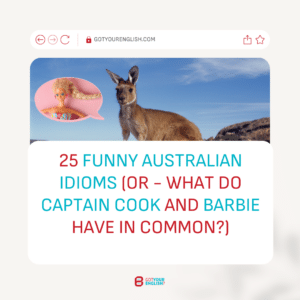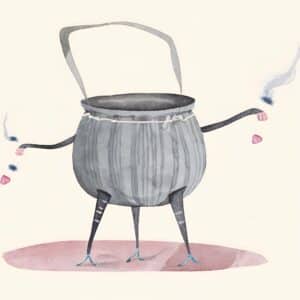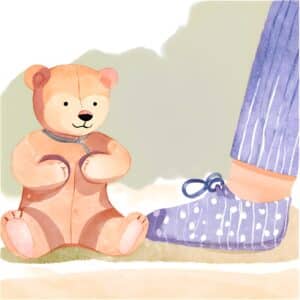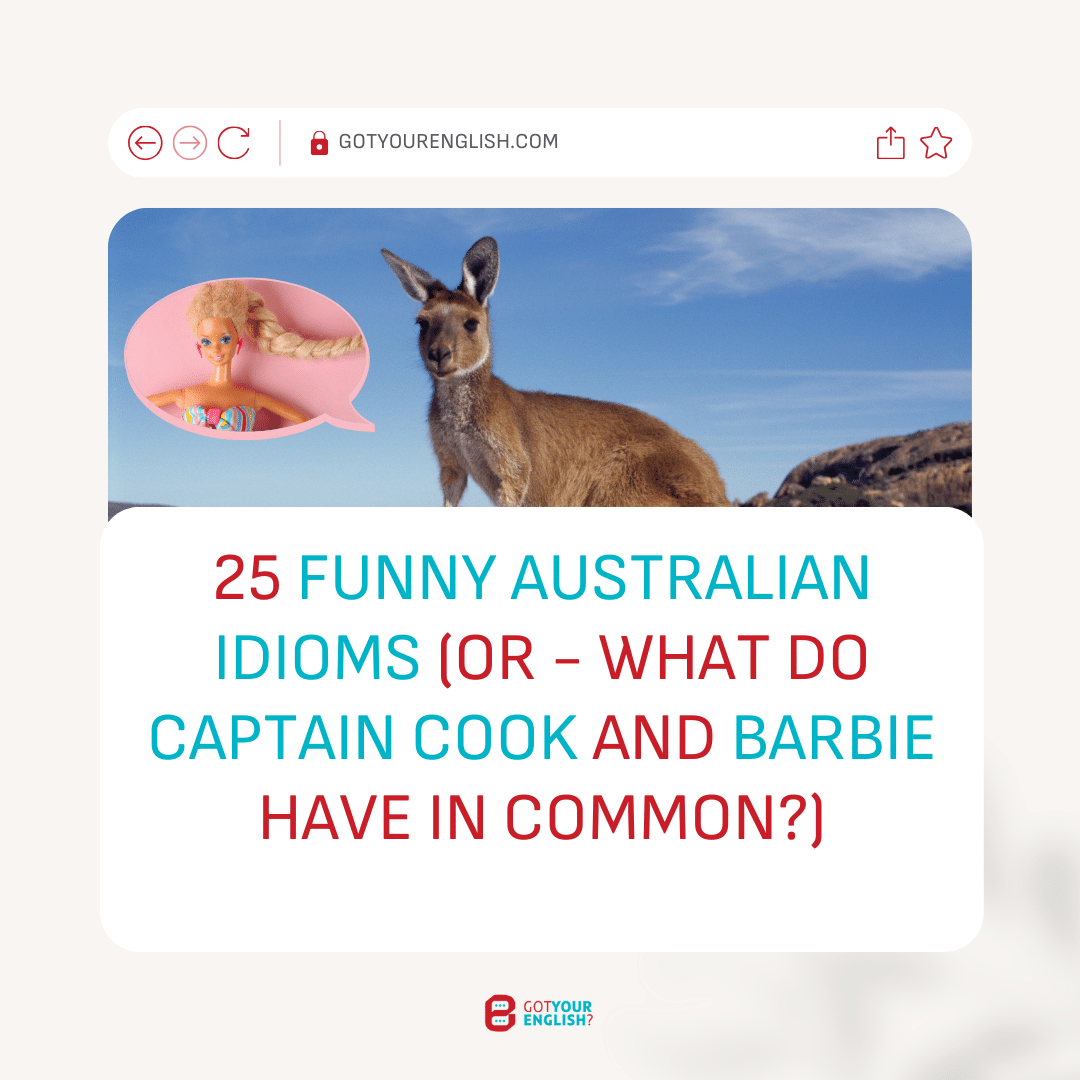
25 Funny Australian Idioms (Or – What Do Captain Cook and Barbie Have in Common?)
We’re continuing our humorous idioms collection! This time, we’ve selected 25 funny Australian idioms, along with 3 bonus phrases.
Even if you’re not planning on visiting Sydney soon, take a look at these hilarious expressions to expand your English vocabulary. Ever wondered what the Aussies mean when they say “barbie”? It’s not the doll!
Previous posts in this series:
>> 16 Hilarious (and Weird) English Idioms You Didn’t Know!
>> 40+ Funny British Idioms (to Speak English Like a Native)!
- On (one’s) hammer – lecturing or scolding someone in a bothersome and repetitive way, especially over something insignificant.
Sentence example: I don’t like having to be on your hammer about this, but you have to start writing your essay. You don’t have much time left to submit it!
- Have a Captain Cook – this is a commonly heard phrase in Australia and refers to having a good look around, especially if someone is searching for something.
Sentence example: Come have a Captain Cook at this – the folder’s missing!

- Wrap your laughing gear ‘round that – this Australian expression encourages someone to eat something, typically delicious food but it can also be used in a threatening way!
Sentence example: This all looks amazing! Come on, wrap your laughing gear ‘round that!
- Throw a shrimp on the barbie – “barbie” is a very popular way of saying “barbecue”. This phrase is a common invitation to cook outdoors, on the barbecue.
Sentence example: Let’s catch up, throw a shrimp on the barbie!
- Carrying on like a pork chop – to behave in a stupid manner or to make a fuss. Some hilarious variations of this phrase are:
Carrying on like a pork chop in Jerusalem on a Saturday.
Carrying on like a pork chop at a Jewish wedding.
Carrying on like a pork chop in a synagogue.
Sentence example: Slow down, mate, you’re carrying on like a pork chop.

Throw a shrimp on the barbie?
- Stir the possum – to spark or spread something controversial, provocative, or divisive. The first recorded instance of this phrase was in 1888, likely originating as the opposite of “to play possum”, which means pretending to be asleep or unconscious when faced with a threat.
Sentence example: I think he’s just stirring the possum with his new Facebook post.
- Do the Harry (Do a Harold Holt) – to escape, disappear, sneak away. It is also rhyming slang for “bolt”. This idiom stems from the disappearance of former Australian prime minister Harold Holt in the 1960s.
Sentence example: He did the Harry and left the party early, I didn’t even get to see him!
- Full up to dolly’s wax – full of food, satiated. It’s a bit of an old-fashioned phrase. It originated from a period before the widespread use of plastics when dolls for children had wax heads connected to cloth bodies.
Sentence example: Oh, I couldn’t eat anymore, I’m full up to dolly’s wax.
- Fair suck of the sauce bottle – this phrase means a fair chance, to keep calm and be rational, usually used in protest. This is just one of the many versions of the Australian saying “fair go”, which reflects a sense of unfairness. Originally, the phrase may have been linked to a “sauce bottle”, referring to a bottle of alcoholic liquor. The expression “fair crack of the whip” carries a very similar connotation.
Sentence example: During the job interview, I wasn’t getting a fair suck of the sauce bottle, I don’t think. Perhaps they had an issue with me being an expat.
- (Flash as) a rat with a gold tooth – defined as ostentatious, flashy, and overly flamboyant. This term typically describes a shady or slightly suspicious man, shining through despite his stylish appearance. This idiom was first documented in the 1970s.
Sentence example: Jerry used to be sweet and humble before he became friends with those wealthy and influential people. Now they’re both as flash as a rat with a gold tooth.
- Flat out like a lizard drinking – incredibly busy, moving at full speed. One meaning refers to lying fully stretched out like a lizard, while the other signifies moving as quickly as possible. This phrase was first documented in the 1930s.
Sentence example: He’s been flat out like a lizard since he came into the office.

A beer for this drinking lizard, please.
- Fair dinkum – honest, authentic, or sincere. This commonly- heard exclamation is often meant to stress how true something is. If someone is “fair dinkum”, you can be confident that they’re being truthful.
Sentence example: Barcelona beat the other team fair dinkum.
- Hip-pocket nerve – refers to a figurative nerve that reacts when financial demands are placed on someone, particularly concerning government proposals for tax increases. The phrase was first recorded in a speech by Prime Minister Ben Chifley in the 1940s regarding taxation. The term originates from the back trouser pocket, close to the hip, where one would typically keep their wallet.
Sentence example: The Ministry’s new proposals will be hitting the hip-pocket nerve and the party might not be able to win over the electorate during the next elections.
- Hard yakka – hard work, especially manual tasks. “Yakka” was initially used in the 1840s as a verb for “working”, originating from the term “yaga” (to work) in the Yagara language of the Brisbane region.
Sentence example: Finally, the house is coming together. It was hard yakka!
- My shout – when someone says they’re paying. For instance, your friend might say that when you’re out in the pub. You might also hear “he wouldn’t shout if a shark bit him”, meaning that someone wouldn’t pay for anything, they’re cheap.
Sentence example: Put your credit card away, it’s my shout!
- Talk the legs off an iron pot – someone who talks a lot. Funny versions of the idiom inlude: „talk the legs off an iron chair“, „talk the hind legs off a donkey/dog” (British).
Sentence example: I feel so drained after our „business calls“. Our team leader could talk the legs off an iron pot.

This iron pot just doesn’t stop talking.
- I didn’t come down in the last shower – I wasn’t born yesterday, I’m not stupid. You can use this phrase if someone is trying to pull wool over your eyes (16 English Idioms You Didn’t Know) or is taking you for a fool. It likely originated in the late 1800s.
Sentence example: Come off it, I know you two are dating! I didn’t come down in the last shower, I’ve noticed how much time you spend together.
- What’s the John Dory? – John Dory is a type of edible fish that inhabits the coastlines of Africa, Southeast Asia, New Zealand, and Australia. This phrase takes advantage of the rhyming of “Dory” with “story”. Hence, this idiom means “what’s the story?”.
Sentence example: I haven’t seen you since the party! Come on, what’s the John Dory?
- Chuck a sickie – Skip work without really being ill. If you’ve ever faked an illness to take a day off from work, you’ve indulged in what’s known as “chucking a sickie”.
Sentence example: I’m chucking a sickie to go to the concert. Care to join?
- Tall poppy syndrome – when someone openly envies another person for their achievements and success and tries to undermine them. The intense criticism directed at such privileged people is sometimes called “cutting down the tall poppy”.
Sentence example: One example of tall poppy syndrome is downplaying your achievements due to fear of being excluded from the friend group.
- Better than a ham sandwich (Better than a kick up the backside) – something that’s not amazing or that useful, but still is better than nothing.
Sentence example: The airline is offering me $200 for my lost luggage. It’s definitely not enough but I suppose it’s better than a ham sandwich.
- Hit the frog and toad – rhyming variation to “to hit the road”, to leave.
Sentence example: I think we’d better hit the frog and toad, it’s getting quite late.

The frog and the toad are ready to hit the road.
- Toads, banana benders, cockies, sandgropers, crow eaters – these are some popular words Australians use to mock people from different regions in the country. These are some popular words (demonyms) Australians use to mock people from different regions.
In tropical Queensland, where there are more bananas and cane toads than people, residents are often called “banana benders” or “cane toads”. Queenslanders retaliate by referring to Sydneysiders as “cockroaches”, a nod to the pests found abundantly in the city. Western Australians are humorously labeled as “sandgropers” for their sandy surroundings. This custom of nicknaming people hailing from different regions perhaps stems from the English calling Australians “Cornstalks” when they noticed how much taller the new Australian generation had started getting.
- Woop woop – this phrase refers to a remote place or location, similar to “the middle of nowhere”.
Sentence example: I’m heading down to woop woop for the holidays!”
- Onya bike. Tell your story walkin’ – this is a dismissive manner of asking someone to leave and stop being annoying, similar to saying “get lost”. This one is a bit rude but is a popular way of expressing your lack of patience for someone.
Sentence example: Stop with that already! You’re getting on my nerves! Onya bike!
BONUS PHRASES:
- Bonzer (bonza) – is a very common Australian equivalent of “excellent,” or “awesome”.
- Big bikkies – meaning “big biscuits” or more literally, a lot of money.
- Ankle-biter – what you might hear an Australian call a small child. One could also use it to describe a tiny, angry dog like a chihuahua. The first recorded use is from the 1800s!

Beware of the ankle-biters!
Which Aussie idiom did you like the most? Let us know in the comments!
Stay tuned for more English vocabulary and grammar in the next blog post!
And if you want to upgrade your English skills even further, check out our English courses here!
Tags:
How useful was this post?
Click on a star to rate it!
Average rating 4.5 / 5. Vote count: 8
No votes so far! Be the first to rate this post.
We are sorry that this post was not useful for you!
Let us improve this post!
Tell us how we can improve this post?





One Response
A game I used to play (Valorant) had a character who had a phrase that included the words “just some hard yakka”.
I had no idea what that meant until now, thank you
As for “ankle biters”, I’ve been calling kids that for approximately ever. And I’m a Canuck!